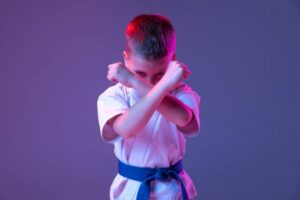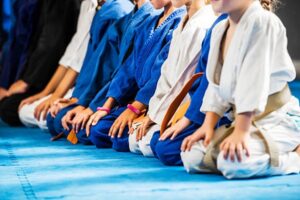The Importance of Personal Defense for Children in Jiu-Jitsu
Jiu-Jitsu has emerged as an effective tool for the physical, mental, and emotional development of children. Beyond the obvious health benefits, the practice of Jiu-Jitsu offers a unique approach to teaching personal defense skills, becoming a valuable resource in children’s education. This article explores the importance of personal defense for children in the context of Jiu-Jitsu, highlighting the benefits that go beyond the simple ability to protect oneself physically.
1. Physical Development:
Jiu-Jitsu is an exceptional form of physical activity for children, promoting the development of strength, flexibility, balance, and motor coordination. Regular practice contributes to the formation of a solid physical foundation, essential for the healthy growth of children. Learn more
2. Building Self-Confidence:
Personal defense in Jiu-Jitsu is not limited to the physical aspect. As children learn to control and overcome challenges during training, they develop a sense of self-confidence and self-efficacy. This confidence applies not only to the mat but transcends into other areas of life, fostering a positive and resilient mindset. Learn more
3. Learning Respect and Discipline:
The structured and traditional environment of Jiu-Jitsu training teaches children fundamental values such as respect for others, personal discipline, and work ethic. These principles are crucial for the moral and social development of children, empowering them to interact respectfully with peers, teachers, and authorities. Learn more
4. Mental Development:
Jiu-Jitsu is a martial art that emphasizes strategic thinking and problem-solving. Children who practice Jiu-Jitsu develop mental skills such as quick decision-making, logical reasoning, and focus. These competencies not only contribute to improving academic performance but are also transferable to everyday life situations. Learn more
5. Bullying Prevention:
Personal defense taught in Jiu-Jitsu can be an effective tool in bullying prevention. Children who have the ability to defend themselves physically are less likely to become targets of bullying, and the confidence gained through practice can deter potential aggressors. Learn more
In short
Jiu-Jitsu as a form of teaching personal defense for children goes beyond the simple ability to protect oneself. It promotes holistic development, encompassing physical, mental, and social aspects. By learning personal defense techniques, children acquire skills that will benefit them throughout their lives, building a solid foundation for healthy growth and the formation of responsible and confident citizens.









